How Crypto Games work: an interview with Sergey Kopov
How relevant are crypto games today? How do they differ from regular video games? How is traffic attracted for them? I answered these and other questions in an interview with App2Top.ru Sergey Kopov, founder of the studio Sunday Games and 0xGames, in which he recently released the crypto game 0xUniverse.
On behalf of App2Top.ru the questions were asked by the issuing editor of the publication Alexander Semenov.
To what extent are crypto games a hype topic today? It seemed to me that the main interest in this topic passed in winter.

Sergey Kopov
Kopov: In winter, crypto games were on the front pages.
The first crypto game appeared last summer – CryptoPunks. She didn’t come in because she was a low-budget experiment.
The authors of the famous CryptoKitties did plus or minus all the same, but with a good production value. And so she blew up the Internet a little bit.
The hype led to the fact that other teams were drawn in this direction. About 600 projects have been announced since December last year. About 50 were released. That’s quite a lot in such a short time.
It is clear that on the part of developers who saw success and ran to do their own, the trend is still relevant. But how great is the interest in crypto games from investors and players?
Cops: The interest is great. Another thing is that there are not so many of both.
The hype with CryptoKitties was so noticeable precisely because it went beyond the limits of the crypto party. All the media wrote about them. They say that crazy comrades resell seals to each other for a crypt that costs thousands of dollars. It was interesting to write about it. They wrote once and calmed down.
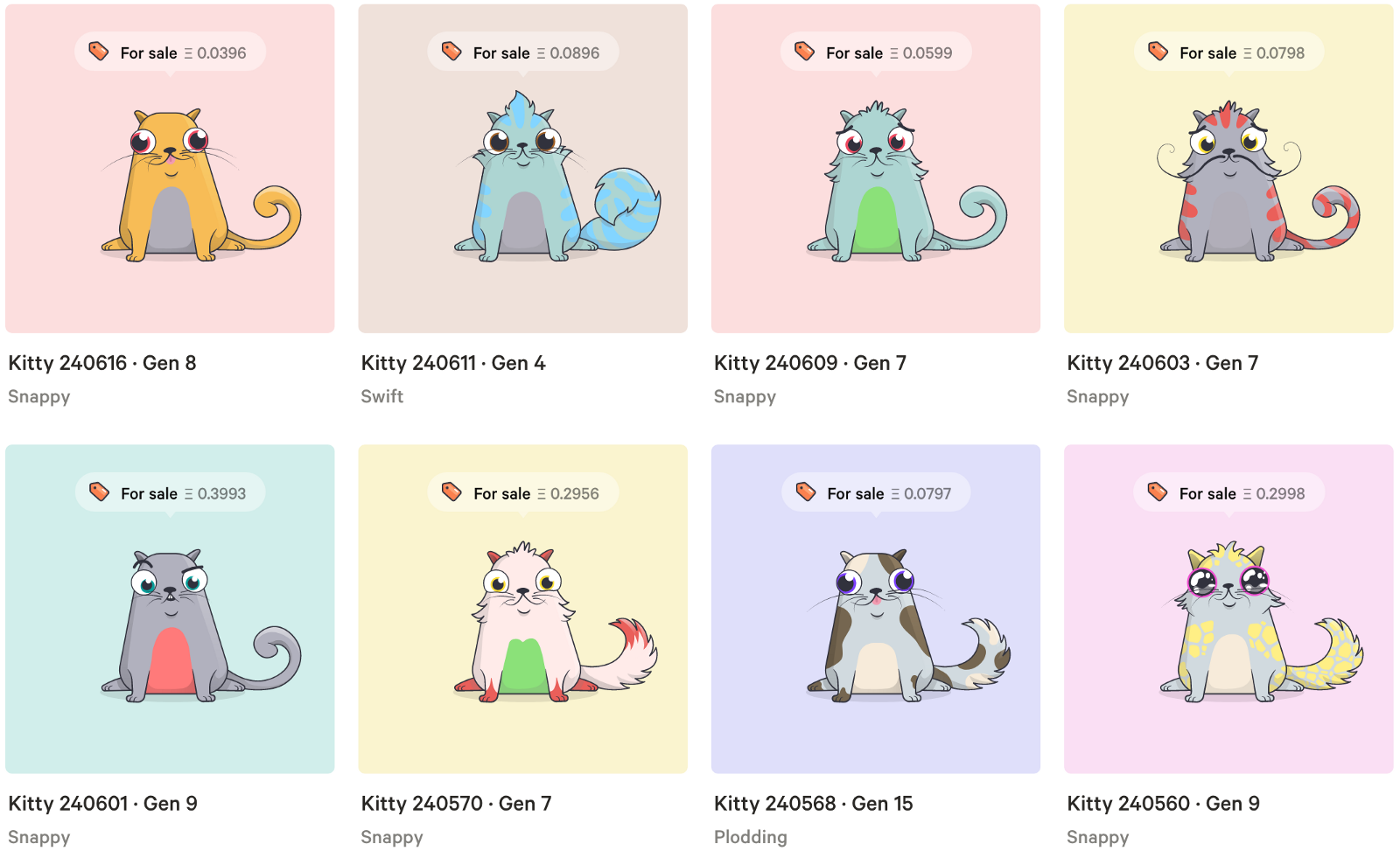
CryptoKitties
As for the crowd, those who constantly work with cryptocurrencies, there, as games with crypto were a promising topic, they remain.
How big is the audience of crypto game players?
Cops: The approximate size of the market is about a million players. This is quite a bit when compared with other niches. About a hundred thousand played CryptoKitties. The games that are coming out now collect less than a thousand players. But we must understand that all these players are paying, with an average check several times higher than, for example, mobile games.
Do I understand correctly that in order to succeed in the crypto games market, you need to reach an audience of one hundred thousand?
Cops: It will be a great success of the CryptoKitties level, yes.
If we talk specifically about the players, how much have they become more, less?
Cops: It’s hard to assess. It seems to me that if we do not take into account the jump in attention that was at the launch of CryptoKitties, then interest is only growing, but not at a very high pace; it is growing approximately with the growth of the crypto market itself. Those factors that limit the growth of cryptocurrencies and blockchain applications in general, they also limit the growth of the gaming audience.
Let’s move from the market to the games now. Let’s start with the basics. What is the difference between crypto games and ordinary ones?
Cops: Crypto games bring with them both limitations and new opportunities.
The limitations are that the current platforms that allow you to do such projects are quite expensive and inefficient to maintain. Therefore, each transaction for changing data in this game takes a long time and costs a significant amount of money for the player.
For example, in our game 0xUniverse, in order to open a planet using a spaceship, you have to pay $ 1-2. It’s not about buying a planet. In this case, according to the game mechanics, the player gets it for free, but he pays for processing the blockchain operation.
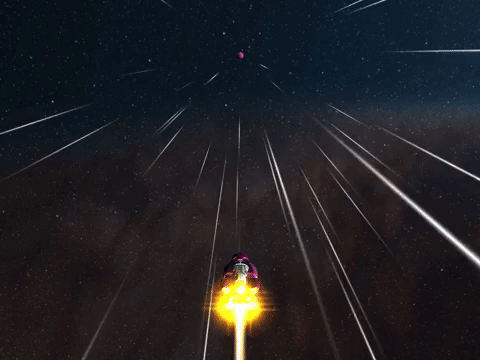
Finding a planet in 0xUniverse
This severely restricts game design on the one hand, but at the same time forces us to come up with new mechanics.
The main advantage of crypto games is the ability to create open and controlled markets that allow players to trade with each other, inside the game, outside the game, with players from other games, allow you to invest money in the game, withdraw money back and even multiply them.
Imagine a classic MMO game in which you buy in-game currency for the purchase of armor and weapons for real dollars. In a crypto game, you can then find some orc in this outfit and knock out even more in-game currency from it, which can then be converted back into dollars.
This creates new opportunities in game design, in designing worlds with open economies. And thanks to this openness, new social interactions can be built here.
For example, when I was thinking about how to implement clans in our game, I no longer started from the classical paradigm, where 20 people gather in a pack, chat and complete quests together. I looked at it as an opportunity to give players entrepreneurial tools. An active player creates a clan, which is more accurately called a company, he completely manages it, and other members of the clan can invest in it. All decisions are made by the head, but investors can vote and change the head. Due to the fact that these rules are open, transparent and no one can deceive anyone anywhere, such schemes are feasible.
Do I understand correctly that any action in any crypto game withdraws real money from the account?
Cops: This is not real money. This is a cryptocurrency that is similar to them. But we are talking only about the current generation of blockchains. Blockchains are currently in development that promise to solve this problem.
Can you clarify what caused this problem at all?
Cops: To understand this, we need to imagine how crypto applications (smart contracts) work in general.
In a regular game, there is a game server that the developer maintains, he pays for it. In decentralized blockchain games, there is exactly the same server, only not only the developer has it, but thousands of other people, who are usually called miners.
Instead of servicing one computer, it is necessary to service thousands of computers around the world that perform the same operations and verify their correctness one after another. Someone has to pay for it and motivate miners to continue paying for electricity.
In other words, if your character finds a sword in the game, you need to save this information. It will be saved not on one computer, but on a thousand. It costs a lot more, and users have to pay for it.
And how are they going to solve this problem?
Cops: As far as I understand, they are going to reduce these duplicate calculations and provide security in a different, more optimal way.
You just touched on the point that the blockchain allowed the gameplay itself to change a little, to make it more realistic. The same probably applies only to strapping. Have the mechanics themselves changed?
Kopov: The mechanics themselves are now in their infancy.
CryptoKitties showed and promoted collectible mechanics. Its essence is that within the framework of the project, the developer releases numerous assets. Players can trade them and use them in some other way. In CryptoKitties, for example, you can pair your cats so that new ones appear, which can also be sold.
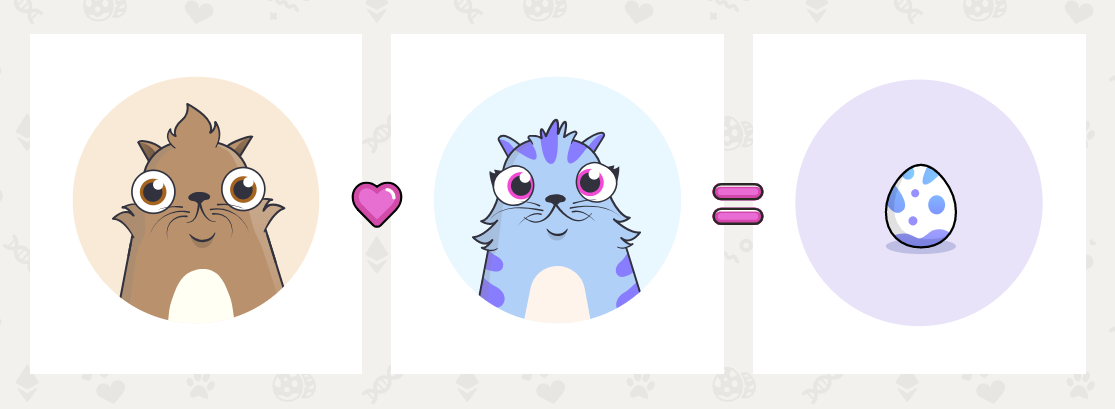
CryptoKitties: cat + cat = egg
In other games, assets can fight with each other, evolve, can be burned into some kind of mana, from which you will buy a loot box.
Developers are trying to experiment within this mechanics, to introduce something new, but no more. So far, everything revolves around these assets. This is a more or less established standard that is interesting to players, easy to implement and whose potential has not yet been fully exhausted.
But this is if we talk about games that are made entirely on the blockchain.
There is also a hybrid approach, when you store only data and some other additional information on the blockchain, and the gameplay is removed from the blockchain.
Here I really like the analogy with Magic The Gathering and any other collectible card games. The developer issues and sells cards. Players buy these cards, take them with them and play where it is convenient for them. They control compliance with the rules themselves. As part of the game, they get nothing but a fan.
The benefit of the blockchain here is that the developer completely relieves himself of all the problems of issuing cards, controlling their distribution and trading between players. All these questions are automated and transparent.
If we don’t talk about a hybrid approach, but about classic crypto games, do I understand correctly that there is no gameplay as such?
Cops: Gameplay is a stretchable concept. The mechanics of collecting is also gameplay, it also brings a fan. Although I understand what you’re talking about, the gameplay is still quite poor, but each new game brings something.
Again, I will give our 0xUniverse as an example.We have planets as assets. They do not exist in an abstract vacuum. All the planets are put on a map, which is divided into sectors. Your strategy for expanding the empire depends on the location of your planets, on what kind of neighbors you have, how populated your sector is in general, what resources are on your planets. Ie, it’s not just collecting, strategy elements appear.
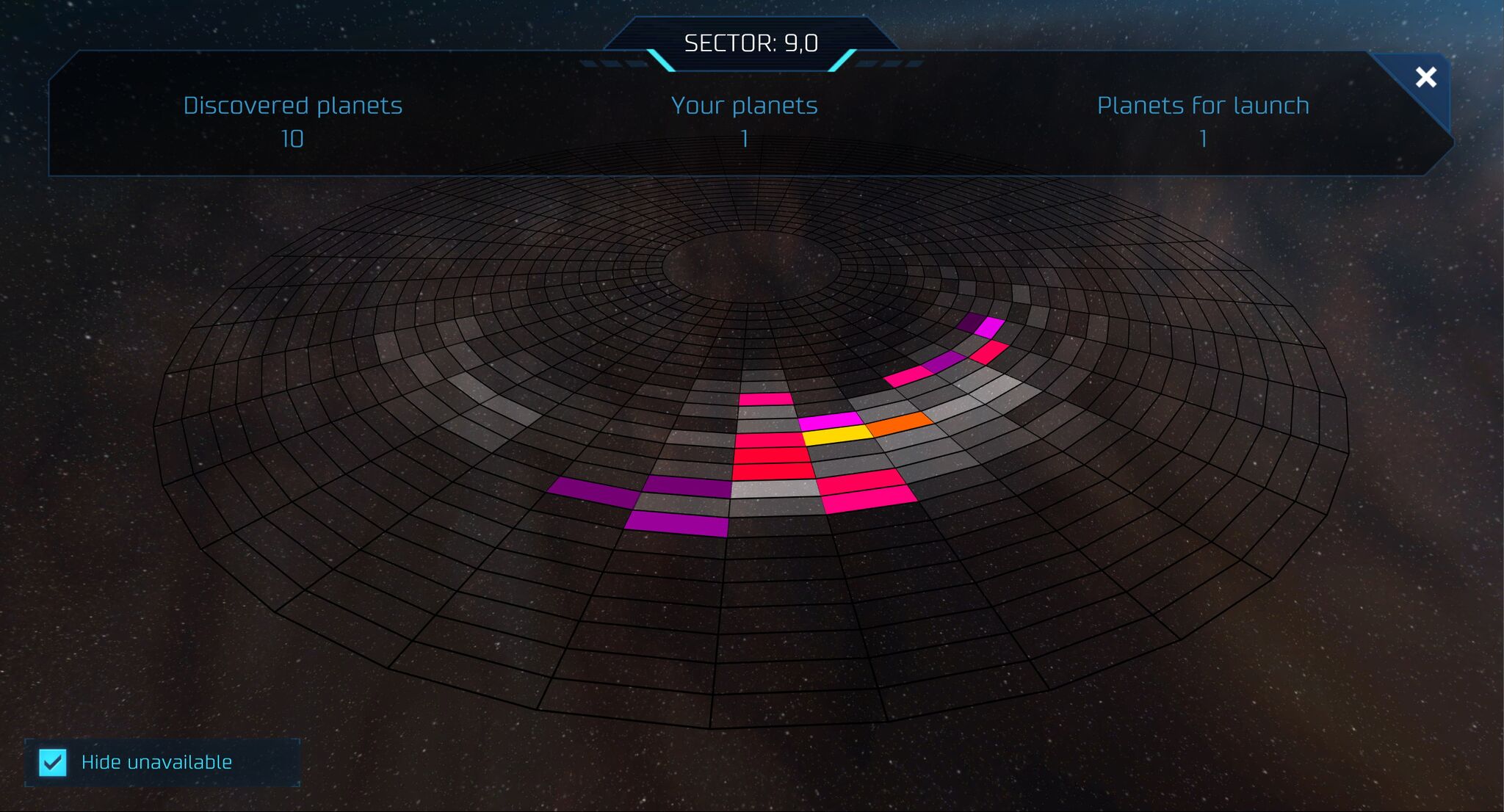
Sectors in 0xUniverse
Sounds like Master of Orion.
Cops: Very simplistic, yes.
For crypto games, any gameplay that fits into a small number of rarely performed transactions is suitable. For example, “travians”, where soldiers go from one castle to another for three to four hours, and then you only see the result of the battle. A whole story, a sea of emotions that were launched with just one click.
Many scold such games for the lack of gameplay, for the lack of depth, but they are very popular among players. First of all, they are valued for their social mechanics, for the opportunity to communicate with other players, for a sense of belonging to a global goal.
Are you trying to implement this model in your project in some way?
Cops: Yes. When we were working on the game, we tried to load it with as many additional mechanics and fans as possible, which would be an add-on to the main gameplay and platform limitations.
For example, we have legendary planets, each of which has its own history. And we sewed the game mechanics into this story. The fact is that only the owner of the planet can find out this story. Players who are interested in this mechanics buy up legendary planets, collect these stories. So they get information that in total makes it possible to go through the plot of the game and get the most valuable planets that cannot be obtained in any other way.
This encourages social interaction. Players communicate more with each other, negotiate, start communicating on forums, “And I know this, and I know that.” This off-blockchain adds an extra fan for players.
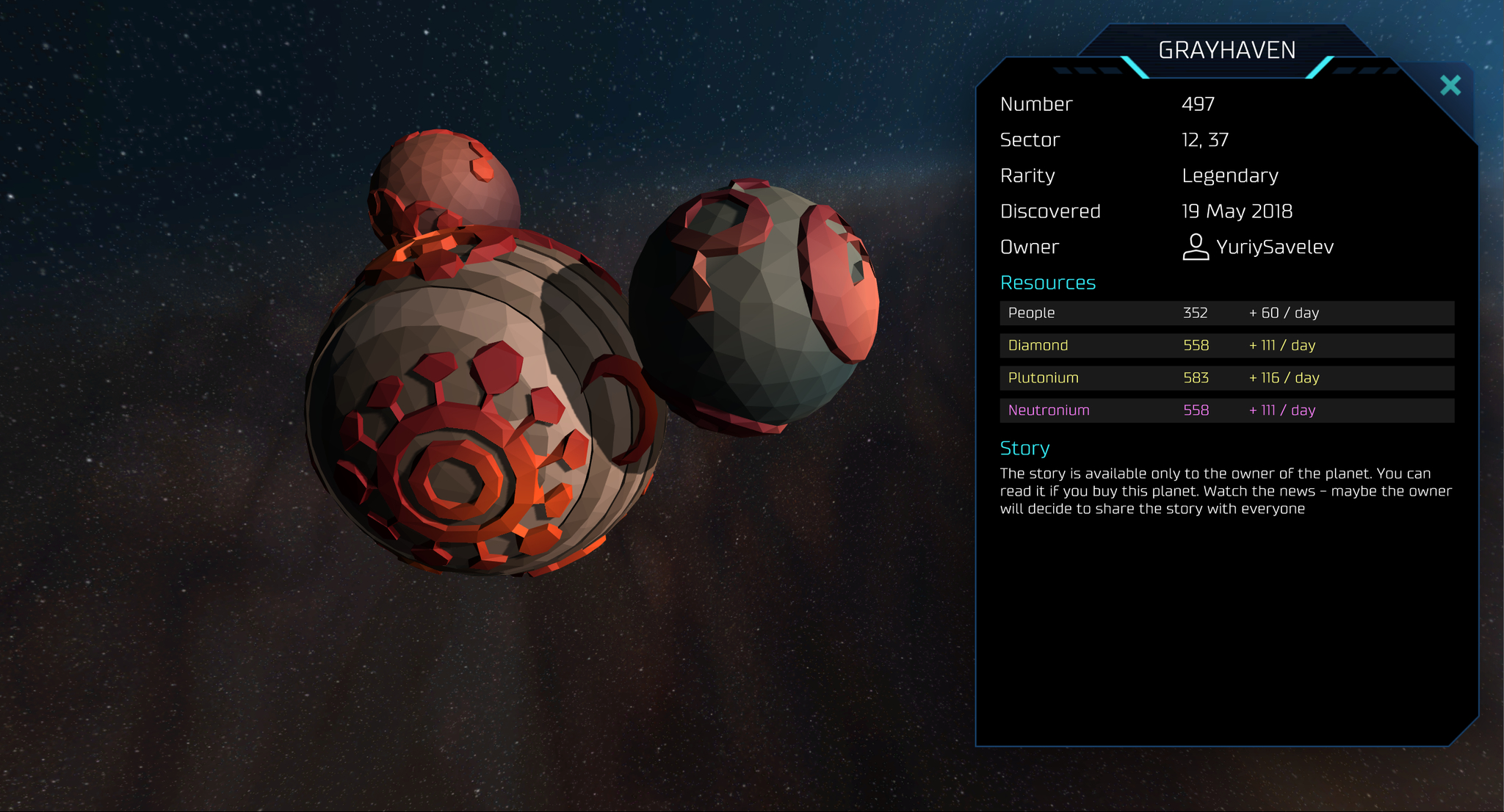
Planets in 0xUniverse
Let’s focus on hybrids now. Do they exist on the same market as pure crypto games?
Cops: Games with hybrid models, on the one hand, are much closer to classic games. But, on the other hand, they are limited to a small audience of people who are not afraid of the word “blockchain” and have some amount of ether in their account.
Therefore, they usually even give some piece of gameplay that can be played without blockchain. For example, if we are talking about a CCG game, developers can give some cards for free. At the same time, there will definitely be a separate group of cards that can be bought only for cryptocurrency.
This is how developers of such projects build their funnel. At first they are interested in the game, and then they are immersed in the wonderful world of the crypt. The problem is that it is much more difficult for such projects to interact with each other.
One of the important advantages of blockchain games, which I did not mention, is the ability for different games to interact with each other, for different developers to work on one game world, to develop one IP.
This is possible due to the fact that the protocols by which these games are made are slowly being standardized. Since all the data is located independently of the developers on decentralized servers, other developers can also use them.
For example, a third-party developer can come and make a game to rebuild their city on the 0xUniverse planets that our players already have, call this game somehow 0xUniverse CityBuilder, and we will develop a common project together, getting income from it.
Hybrid projects do not have such an opportunity.
Why not?
Cops: They have a large part of the game outside the blockchain, and other developers can’t track what’s going on there.
For example, in our game, planets produce resources, and these resources can be spent on something. In our particular game, we spend these resources on building ships that are looking for new planets, and another developer can make it so that these resources can be spent on something else, on building cities. And players will be able to spend these resources in a different way.
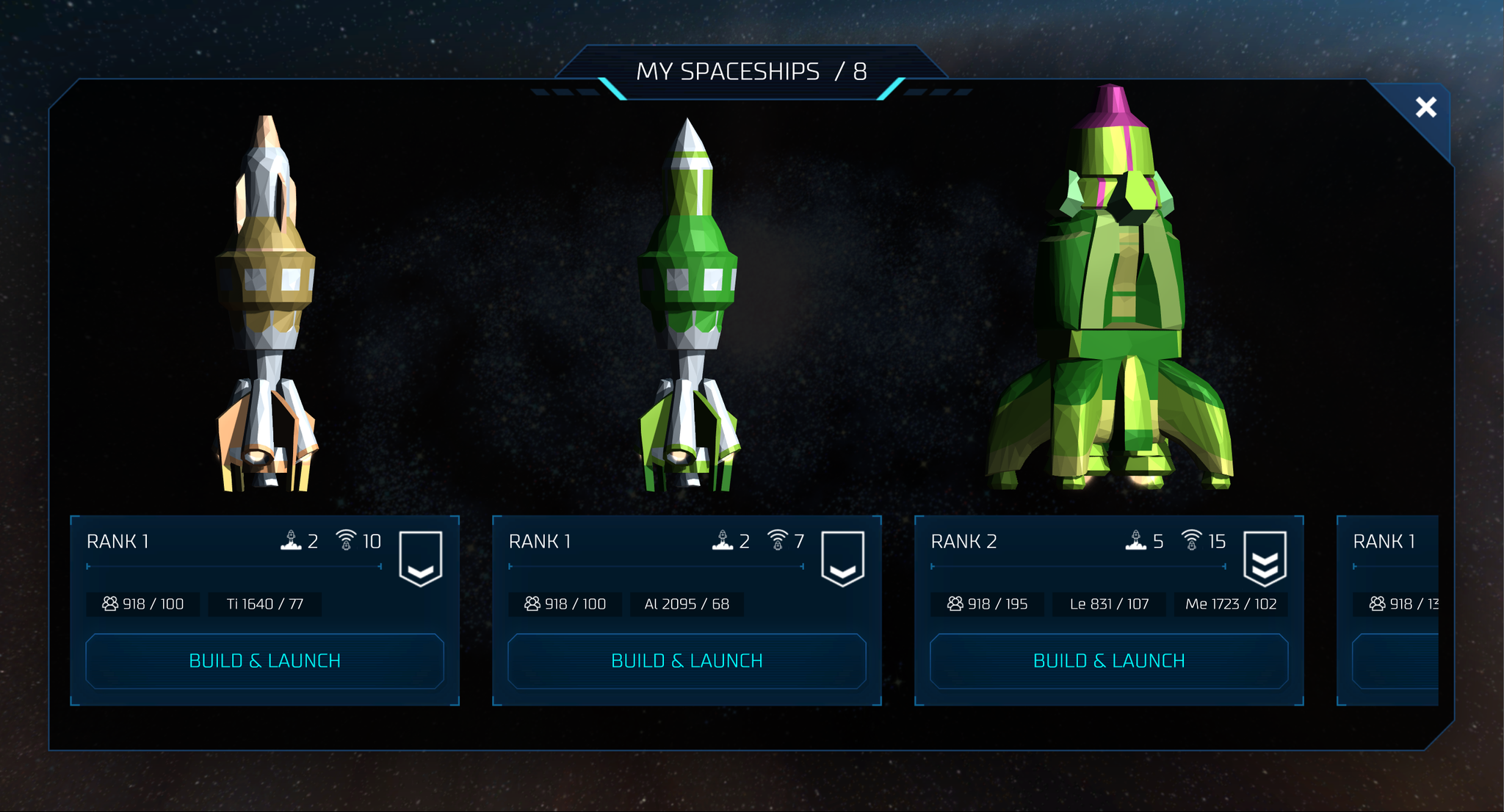
Ships in 0xUniverse
What currencies are commonly used in crypto games today?
Cops: Usually it’s not a question of choosing a currency, they usually talk about choosing a blockchain, a platform.
There are many exchangers that will transfer one cryptocurrency to another with minimal effort.
The question about blockchains is more relevant because everyone has their own capabilities and limitations. Now the most common, proven toolkit is Ethereum. He has several direct clones – for example, the Chinese Neo.
Hybrid blockchains are also appearing now, which, becoming on top of the existing Ethereum, expand its capabilities and throughput. For example, there is a Loom project. It allows you to do something similar to the hybrid gameplay that we talked about without going beyond the blockchain. I.e., the main data is stored in Ethereum, the gameplay also takes place in the blockchain, but in Loom.
There are also completely new blockchains that also promise the possibility of creating decentralized applications with high speeds and the absence of all these problems, but they have not yet reached a mature release when it would be possible to switch from Ethereum to them. They can be expected during this year.
What are the analogues of the App Store for crypto games?
Cops: They are not there now – big, popular ones that could give a game developer cheap traffic. But they are being built. There are a lot of projects that claim to do this.
Just the other day I was talking to a platform called WAX. It was created by the authors of a platform that sells items from classic games, for example, from Counter-Strike.
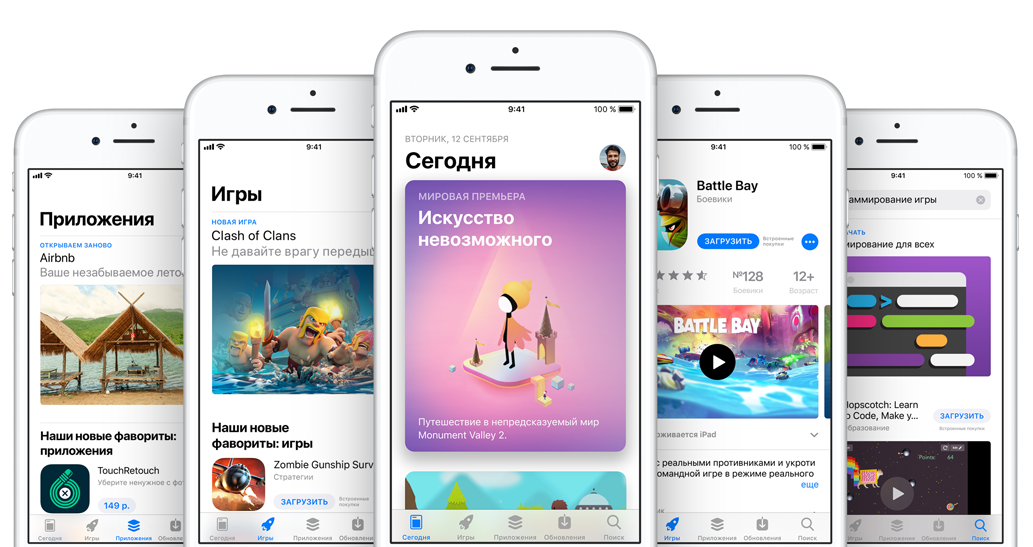
The Crypto market now lacks its own App Store
She has the following model: you dump assets from your game, and they promote the game among their users.
Over time, there will be more and more such sites. There are few of them now.
From the point of view of marketing in the crypto games market, the developer needs to rely only on himself, to invest as much as possible in performance marketing, in buying traffic.
Do I understand correctly that the main channel of attracting users for blockchain platforms today is the independent pumping of traffic of their own pages on the Internet?
Cops: Yes.
There are two mechanisms: direct purchase and purchase through PR. Now the market is very similar to, for example, mobile at the very beginning. I remember that in the old days it was enough to have one article on iPhones.ru so that you flew into the Russian top. This is typical only for the initial state of the market. It passes quickly.
This is exactly the case in the blockchain right now. Several articles on popular crypt sites brings users. You can build your strategy only from this.
We are coming to the end of the conversation. Are you happy that you took a risk and entered this market?
Cops: Rather, I am satisfied. There are no big disappointments.
Can you name your mistakes?
Cops: The first and the biggest — when planning, I expected that there would be more real players. I came across the fact that about half of the audience are speculators, and not those who come for the sake of the fan. Many come only to buy at a big discount, then sell. The gameplay itself is usually of little interest to them.
But this is also a traffic problem. We ourselves promote games in publications whose target audience is not gamers, but traders, investors.
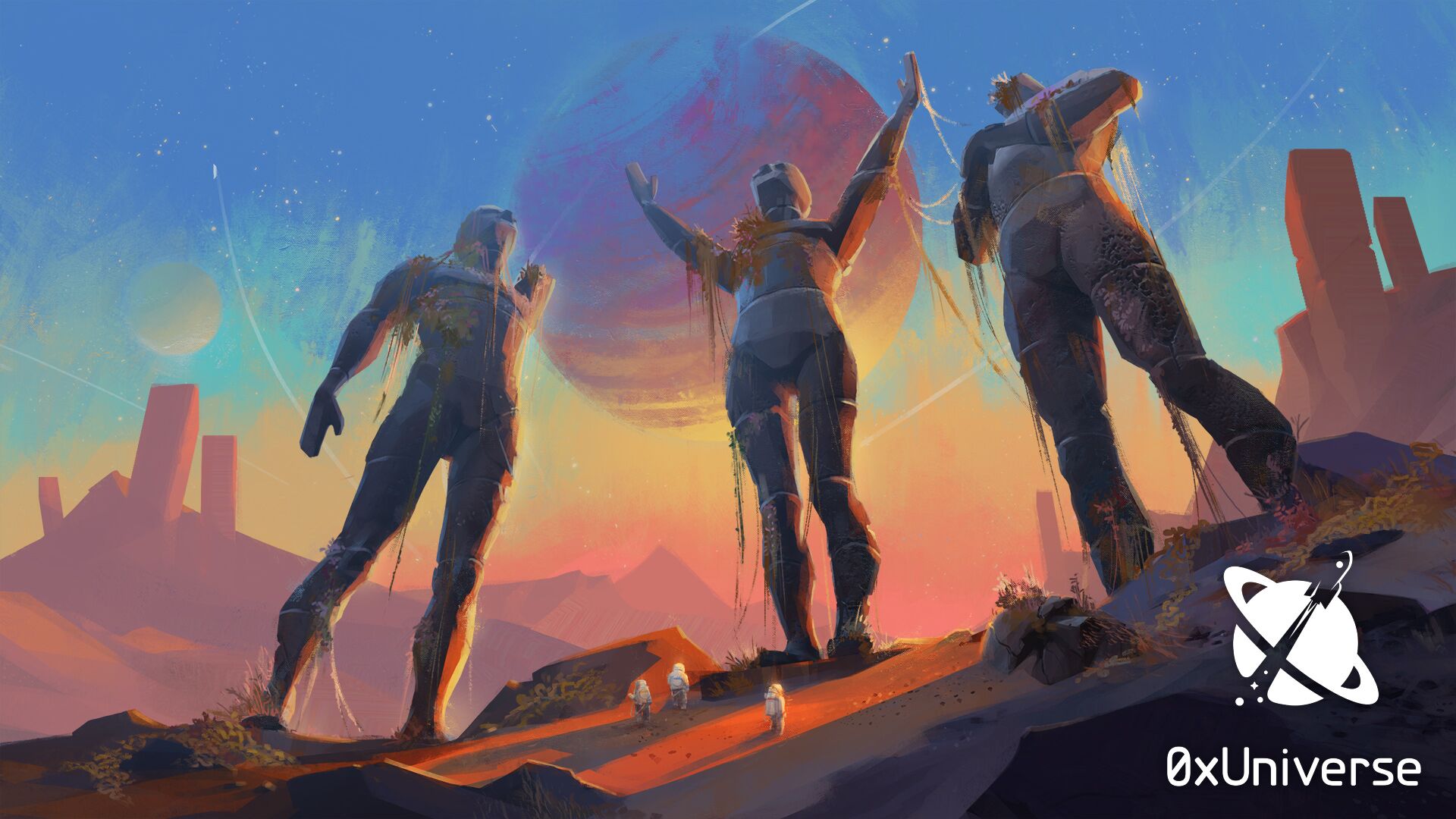
The right people don’t always come to the crito games
This problem should be solved with the expansion of the audience, with the advent of new effective blockchains, with the advent of mobile games on the blockchain.
Six months ago, we thought that there are no mechanisms for entering the mobile market yet, but now they are starting to appear. Soon, a model will be implemented that will not violate the rules that Apple and Google set for their applications. If the platform does not revise its policy, then within a few months we will see a boom in mobile blockchain games.
The main problem that you are now noting is the players?
Cops: Limited audience and its slow growth.
Slow audience growth due to high entry threshold?
Cops: Yes.
But do you believe in the market and are you not confused by the skepticism that many people feel about it?
Cops: It is important to understand here that there is an ICO market, and there is a market for crypto games.
The so-called ICO market has already formed. There are a few people doing something in it, basically everyone is deceiving each other. Therefore, this whole area has a bad reputation, and large platforms try to avoid them.
From the point of view of blockchain games, everything is mostly white and fluffy here. Few people here raise money for promises. Players understand what they are paying for and don’t leave disappointed.
Thanks for the interview!